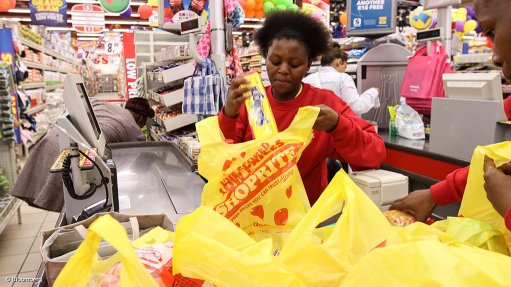
PLASTIC POLLUTION
Since its introduction, the plastic bag levy has reduced the use of plastic bags from ten-billion to four-billion bags a year, an estimated reduction in use of between 45% and 75%
Photo by: Bloomberg
Since the introduction of the plastic bag levy scheme in 2004, more than R1.1-billion has been collected and deposited into the National Revenue Fund, from which R216-million was allocated up to the end of August to the Department of Environmental Affairs (DEA) for recycling initiatives.
The levy was introduced to tackle the environmental impact of plastic shopping bags as litter on fences, trees, open veld and at waste facilities using normal refuse collection systems.
The DEA initially aimed to ban plastic shopping bags, but this would have resulted in job losses in the plastics industry. Therefore, a memorandum of agreement was entered into by government, organised labour and business.
Since its introduction, the levy has reduced the use of plastic bags from ten-billion to four-billion bags a year, an estimated reduction in use of between 45% and 75%.
However, according to the National Treasury, a more recent trend shows an increase in producing and importing plastic bags.
The levy was introduced at 3c a bag in 2004, payable by plastic bag manufacturers and importers. It increased to 4c a bag in 2009 and to 6c a bag in 2013.
According to a report released by the National Treasury, it is necessary to increase the levy from time to time as the levy is a specific tax and to “ensure that inflation does not erode the real value of the tax”.
Part of the R216-million allocated to recycling initiatives went to nonprofit company Buyisa-e-Bag, which was funded through transfers from the fiscus through the DEA on the basis of approved business plans that were submitted to the department.
The company was established to promote plastic-bag recycling, waste reduction, awareness in the plastics industry and expansion of collector networks, as well as increase job creation and capacity building, and support the collection of plastic bags in rural areas through small and medium-sized enterprises.
According to the DEA, Buyisa-e-Bag had established 15 plastic buy-back centres and supported 25 existing facilities.
The buy-back centres and recycling facilities were established in the Mhluzi and Govan Mbeki municipalities, in Mpumalanga, in 2007 and 2009 respectively.
In the 2010/11 financial year, Buyisa-e-Bag was absorbed into the DEA.
About R11-million of the reprioritised funding was allocated to the National Regulator for Compulsory Specifications to implement the regulations pertaining to plastic bags and more than R31-million was allocated to the department’s Programme 6: Environmental Programmes.